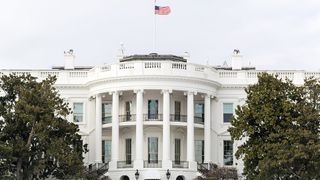Trump Asserts His Primacy in Protecting 5G Security

President Donald Trump signed the Secure 5G and Beyond Act of 2020 Monday (March 23), but then issued a statement of the powers he said he retains regarding the implementation of the law.
Related: House Passes Secure 5G Act
The Act directs the President to develop a "Secure Next Generation Mobile Communications Strategy” in consultation with the heads of FCC, NTIA, and Department of Homeland Security, as well as the DNI and Secretary of Defense."
"As part of the strategy, section 4 of the Act purports to require the President to engage in international diplomacy in order to share information and pursue policy goals specified by the Congress," the President said in a statement.
But he addressed that purported requirement. "Consistent with longstanding constitutional practice, my Administration will treat the relevant provisions of this section in a manner that does not interfere with the President's exclusive constitutional authorities with respect to foreign relations, including the President's role as the sole representative of the Nation in foreign affairs," he said.
Then there was the section he said "purports to condition the President's authority to implement parts of the strategy upon the approval of the Federal Communications Commission." He had a caveat for that provision as well. "My understanding is that this provision does not preclude me or future Presidents from exercising our constitutional authorities as the "sole organ" of the Nation in foreign relations and as the head of the unitary Executive Branch to ensure proper implementation of the entire strategy," he said.
House Energy & Commerce Committee leaders were applauding the signing, suggesting it was even more important given the pandemic.
Multichannel Newsletter
The smarter way to stay on top of the multichannel video marketplace. Sign up below.
“The bills signed into law today by the President are critical to ensuring that all Americans can access broadband and that our networks are secure and trusted," said a bipartisan quartet of committee leaders. "The need for connectivity is even more critical now that millions of Americans are teleworking and learning from home in response to the coronavirus pandemic.
It was 'bills" plural because the President also signed S.1822, the Broadband Deployment Accuracy and Technological Availability (DATA) Act, which requires the FCC to collect more granular data on where broadband is and isn't.
Joining in the statement were Energy and Commerce Committee chairman Frank Pallone (D-N.J.), ranking member Greg Walden (R-Ore.), Communications Subcommittee chairman Mike Doyle (D-Pa.) and subcommittee ranking member Bob Latta (R-Ohio).
Also praising the passage of the DATA Act was Sen. Roger Wicker (R-Miss.), chairman of the Senate Commerce Committee. “To close the digital divide, we need accurate maps to show where there is broadband service and at what speeds it is being offered," Wicker said. "This legislation requires the FCC to update its flawed maps to help deploy service to the estimated 20 million Americans without access to broadband. I thank the President for signing this bill into law.”
The FCC is already working on a process for collecting more granular broadband availability data and allowing it to be publicly vetted.
The commission has been under pressure from both sides of the aisle in Congress to improve data collection, and FCC chair Ajit Pai has conceded the data has to get better, particularly so that Universal Service Fund broadband subsidies can be targeted to where they are most needed, furthering his goal of weeding out waste, as well as fraud and abuse, in subsidy programs.
The commission voted unanimously, with two partial dissents by the Democrats, on a Report & Order Thursday (Aug. 1) to create a new Digital Opportunity Data Collection regime based on geospatial broadband coverage maps provided by fixed Internet service providers--it does not apply to mobile broadband, at least not yet.
The FCC will also establish a mechanism for the public to crowdsource the accuracy of the maps.
Contributing editor John Eggerton has been an editor and/or writer on media regulation, legislation and policy for over four decades, including covering the FCC, FTC, Congress, the major media trade associations, and the federal courts. In addition to Multichannel News and Broadcasting + Cable, his work has appeared in Radio World, TV Technology, TV Fax, This Week in Consumer Electronics, Variety and the Encyclopedia Britannica.

